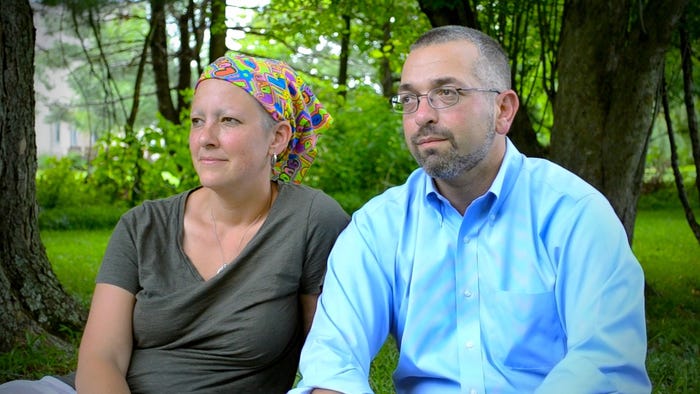Power Morcellation Critics Win Restraining Order against Hospital
November 4, 2015
Hooman Noorchashm and his wife Amy Reed, physicians who launched a national campaign to stop power morcellation, were recently subjected to enhanced security procedures before Reed was admitted to the operating room for an emergency cancer surgery at Brigham & Women's Hospital (BWH).
Qmed Staff
|
Amy Reed, MD, PhD and Hooman Noorchashm, MD |
A judge in Suffolk County, Massachusetts, agreed on November 3 with a motion for a temporary restraining order against BWH hospital, a 739-bed teaching affiliate of Harvard Medical School. The motion alleged that the hospital had denied the couple's First Amendment rights, by subjecting the couple to "enhanced security procedures" as retaliation of their criticism against the hospital's use of power morcellation.
Noorchashm and Reed alleged the enhanced security measures targeted at the couple were a form of retaliation in response to the couple's campaign to ban power morcellation. The security procedures required that two be frisked and that Noorchashm be escorted by a security guard at all times while in the hospital. Noorchashm was threatened that he would be denied entry to the hospital if he didn't comply. The hospital management had insisted the protocols were necessary because they alleged Noorchashm had made veiled in his communication with its leaders after his wife was treated at the hospital via power morecellation.
Noorchashm, a cardiothoracic surgeon who had formerly worked at Brigham, helped bring national attention to the power morcellation issue, triggering a U.S. Government Accountability Office investigation into the user of the devices, which have been associated with spreading cancer in some patients.
Both Noorchashm and his wife were put under surveillance and had their possessions searched at the behest of Ron Walls, executive vice president and chief operating officer. This prompted Noorchashm's attorney to file a restraining order against the hospital, accusing it of "retaliatory action" amidst Noorchashm's prior complaints regarding the hospital's handling of power morcellation. Elizabeth Fahey, the judge in Suffolk County reviewing the motion, agreed to the temporary restraining order against the hospital, ordering the hospital to revoke the security measures, explains an article in The Cancer Letter.
The motion for a temporary restraining order states that the hospital's security policies related to Noorchashm and Reed "were put in place to intimidate, coerce, and threaten Plaintiffs. The intrusive searches and required security presence made Plaintiffs' feel extremely uncomfortable and experience substantial emotional duress during what was already a very difficult time given the serious nature of both Dr. Reed's condition and the surgery she was to have performed."
In 2013, Reed was treated at Brigham & Women's Hospital for what her doctors had assumed benign uterine fibroids. The surgeon performed a total laparoscopic hysterectomy that involved the use of a power morcellator. After the surgery, Reed was diagnosed with uterine leiomyosarcoma, an aggressive cancer, and the morcellation played a role in spreading the cancer throughout Reed's body, upstaging it from cancer stage I to stage IV.
Consequently, the couple began protesting the use of power morcellation, calling for a ban of the procedure. Their efforts have played a role in triggering FDA warnings about the procedure and all but halting insurance reimbursement for the procedure.
The couple has also emerged as vocal critics against Bayer's Essure.
Noorchashm also lobbied directly to the leaders of Brigham & Women's Hospital and has publicly complained about the hospital's lack of a response. The hospital ultimately introduced new rules guiding how and when a power morcellator is used during surgery.
Last year, a German morcellator maker Karl Storz threatened legal action against Noorchashm, accusing him of defaming their Rotocut morcellators and the company.
Norchashm's campaign also has extended to the top device cop at the CDRH, Jeffrey Shuren, MD. Noorchashm states on a Change.org petition, for instance, that Shuren's spouse is Allison Shuren, a partner at Arnold Porter and co-chair of the firm's FDA/Healthcare practice group. Ms. Shuren's focus of practice is defending pharma and device clients on matters of false billing claims, fraud on the FDA, and allegations of regulatory non-compliance. As a recent article by James Dickinson states: "Noorchashm targeted Shuren for allegedly 'being in bed with' industry through his support of device marketing without proof of safety and through Shuren's wife, Allison, and her legal work with device companies as a partner at the law firm Arnold & Porter."
Learn more about cutting-edge medical devices at Minnesota Medtech Week, November 4-5 in Minneapolis. |
About the Author(s)
You May Also Like



